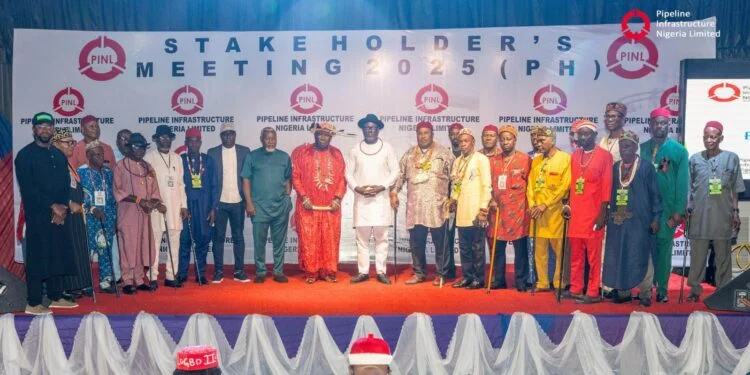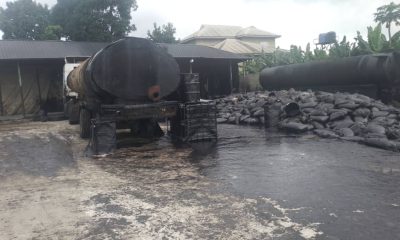News
A Look At How PINL Is Boosting Nigeria’s Oil Revenue By Preventing Loss Of $700 Million Per Month

Historically, the mainstay of the Nigerian economy, the oil and gas sector accounts for the largest portion of the country’s foreign exchange earnings (over 85%) and a significant share of government revenue (ranging from approximately 35% to over 70% in various years).
Hence, the critical role of Pipeline Infrastructure Nigeria Limited, PINL in the oil and gas sector, cannot be overemphasized nor underestimated, if the Country wants to sustain its soaring height, in terms of revenue generation and funding of its critical sectors of the economy.
Pipeline Infrastructure Nigeria Limited, PINL is a key player in Nigeria’s oil and gas sector, following its undeniable and impactful contributions, geared towards securing oil pipelines and other critical infrastructure of the Country.
What the Company is doing on a regular bases is to mount and maintain an eagle eye surveillance on pipelines within the eastern corridor of the Trans Niger Pipeline, TNP within the Niger Delta region.
Again, the role of the Company is very critical and pivotal, if the revenues accrued from the oil and gas sector are to remain continuous at the level of geometry and not otherwise.
In the context of the Nigerian oil and gas sector, it is no longer news that Pipeline Infrastructure Nigeria Limited (PINL), contributes massively to the nation’s revenue size by providing pipeline security and surveillance services.
The Company’s efforts have led to improved security in the Niger Delta, which in turn has significantly reduced crude oil losses and increased production, helping the Federal Government meet its oil revenue targets.
PINL’s specific contributions to national revenue generation include but not limited to ensuring pipeline integrity.
This it does by protecting critical infrastructure, such as the Trans Niger Pipeline (TNP), from vandalism and illegal bunkering.
PINL has helped to achieve higher pipeline availability (reported at 97% across the upstream network at one point) and reduce crude losses.
The improved security and reduced downtime have enabled increased crude oil lifting and production levels, a major factor in meeting or surpassing national revenue targets.
PINL has helped in facilitating government revenue collection by ensuring a stable and secure operating environment.
PINL’s activities indirectly ensure consistent revenue flows to government coffers through royalties, taxes, and the sale of oil and gas resources by entities like the Nigerian National Petroleum Company Limited (NNPCL).
It has equally supported the overall stability of the nation’s economy. The increased revenue from the oil and gas sector allows the government to fund its national budget, infrastructure, and development projects, which are essential for economic growth.
It is therefore on record in this country, that the primary operational entity making a significant, documented contribution to the nation’s revenue through its field operations is Pipeline Infrastructure Nigeria Limited (PINL).
It has been able to tackle and prevent incidences of pipeline vandalism, which hitherto was an unabated phenomenon in the years gone by.
Pipeline vandalism, which PINL has over five years prevented from occurring and reoccuring oftentimes lead to economic losses, environmental degradation, human safety hazards like fire outbreaks, social disruption, and national security threats.
More of these negative impacts include reduced revenue, destroyed habitats and contaminated land, potential loss of lives from explosions, community displacement, and increased conflict fueled by illegal oil activities.
This ugly trend has equally made operations to be halted within the oil and gas sector, leading to shutdowns of plants and oil terminals, which can cause operational deficits for multi-million naira companies like the Nigerian National Petroleum Corporation (NNPC), among others.
It has also led to the reduction in gas supply, affects electricity generation, and the scarcity of petroleum products, which in turn cause price instability and economic hardships to Nigerians.
The case of environmental degradation, soil and water contamination are major challenge caused by vandalism of pipelines in the Country.
We are aware that spills contaminate soil and groundwater, destroying crops and making land unusable for agriculture.
In addition, when habitats are destroyed following the vandalism of pipelines, this can lead to the loss of vegetation, deforestation, and the destruction of ecosystems, including mangrove forests and rainforests.
Another major threat to the health state of Nigerians following this ugly trend is the health hazard caused by gas flaring, which releases toxic chemicals, and oil spills, that in turn deplete fish populations and harm wildlife.
Vandalized pipelines are prone to explosions and infernos, which can be as powerful as a bomb and result in significant loss of life and property as exposure to leaked substances and gas flares can cause respiratory problems, aggravate asthma, and lead to diseases like leukemia.
Communities can be displaced due to the direct dangers posed by vandalism and spills. The environmental damage harms the livelihoods of people, particularly those who depend on fishing and farming. This could eventually lead to poverty, unemployment, and a lack of viable economic alternatives often fuel the cycle of vandalism, which further exacerbates economic instability in affected areas.
Pipeline vandalism is often linked to organized criminal activities and illegal oil bunkering networks. The competition for control over illegal oil routes can fuel armed conflicts and increase general insecurity across regions.
Emphatically, the dangers posed by pipeline destruction in Nigeria is a major threat to the national economy by causing significant revenue loss, decreased oil production, environmental devastation, and a challenging investment climate.
The negative impacts are enormous as it is on record that Nigeria loses billions of dollars annually due to crude oil theft and product losses from pipeline vandalism. Findings suggest daily losses can be as high as 470,000 barrels per day (bpd), translating to approximately $700 million per month in lost revenue.
It was gathered that the frequent attacks by militants and vandals had at some point forced the shutdown of production activities and export terminals, such as the Forcados terminal. This resulted in the country consistently failing to meet its OPEC production quotas, which has previously caused Nigeria to lose its position as Africa’s largest oil producer.
The direct and indirect costs of pipeline vandalism have a negative effect on Nigeria’s GDP and overall economic growth. The lost production in 2016 alone was estimated to be enough to finance a significant portion of the national budget.
Oil companies and the government incur massive costs for pipeline repairs and environmental clean-ups. The Nigerian National Petroleum Corporation (NNPC) has reported billions of Naira in operational deficits directly linked to these incidents.
Vandalism hinders the consistent supply of crude oil to refineries and refined products to depots, leading to product scarcity, higher prices for consumers, and operational challenges for businesses reliant on a stable power supply.
The ongoing insecurity and high operational risks in the Niger Delta region discourage potential domestic and international investors from the oil and gas sector, leading to a loss of potential revenue and job opportunities.
Having enumerated the challenges emanating from pipeline vandalism in the Country and its attendant consequences, the role, position and place of Pipeline Infrastructure Nigeria Limited, PINL, clearly comes into focus as the Company has adopted many innovative approaches towards ending the menace.
Among the approaches adopted include a multi-layered surveillance strategy that integrates advanced technology, robust community engagement, and strategic collaboration with government security agencies.
Host Community Engagement: This is a cornerstone of PINL’s strategy, treating host communities as key stakeholders and fostering a sense of “ownership” of the pipelines.
Employment and Empowerment: PINL engages thousands of local youths and community members as surveillance guards, providing them with job opportunities and a stake in protecting the infrastructure.
They also offer scholarships and skill acquisition programs, particularly for women, which help to alleviate economic grievances that might otherwise lead to vandalism.
Whistleblower Initiative: A “you see something, you say something and get rewarded” system incentivizes community members to provide real-time intelligence on illegal activities.
Regular Dialogue: The Company holds monthly stakeholder meetings with traditional rulers, youth leaders, and community development committees to address grievances, solicit input, and ensure continuous collaboration.
Operational and Military Collaboration
Joint Operations: PINL conducts joint operations with government security agencies (GSAs), including the Office of the National Security Adviser (ONSA), the military, and the Joint Task Force (JTF).
Intelligence-Driven Operations: Surveillance is intelligence-driven, leveraging information from the communities to dismantle illegal bunkering networks and shut down illegal refineries.
Prosecution of Vandals: Collaboration with authorities has led to the prosecution and imprisonment of over 100 individuals involved in pipeline crimes, creating a strong legal deterrence.
Physical Patrols: Security personnel conduct consistent physical patrols along pipeline routes to identify and respond to immediate threats.
Technology Integration
Centralized Command and Control: PINL works closely with the NNPCL’s centralized Command and Control Center, which coordinates security for major pipelines.
Sensor Networks: The company is incorporating a blend of traditional methods and modern digital technologies, including wireless sensor networks (WSNs) and fiber optic sensors, to detect anomalies, pressure changes, and structural tampering in real-time.
Remote Monitoring: The system includes remote monitoring capabilities, potentially using drones and satellite imagery, to enhance detection and rapid response capabilities.
This comprehensive strategy has been credited with significantly reducing pipeline infractions, sometimes to “near-zero,” and boosting oil production in the areas it operates, particularly along the Trans-Niger Pipeline (TNP) corridor.
All these measures, among others have been put in place by Pipeline Infrastructure Nigeria Limited, PINL, to ensure a continuous rise in the nation’s revenue within the oil and gas sector.
Pipeline Infrastructure Nigeria Limited (PINL) has been widely commended by various organizations, government bodies, and community stakeholders for its efforts in reducing oil theft and pipeline vandalism through effective community engagement and security strategies.
Key entities that have commended PINL include: Government and Industry Bodies:The National Security Adviser (NSA). The Nigerian National Petroleum Company Limited (NNPCL) and its Project Monitoring Office. The Federal Inland Revenue Service (FIRS), which linked the peace in the Niger Delta fostered by such efforts to meeting its oil and gas revenue targets.
The Bayelsa State House of Assembly Committee on Youths. Community and Regional Groups: The Orashi National Congress (ONC). The Niger Delta Progressives Alliance (NDPA).
The Movement for the Survival of the Ijaw Ethnic Nationality in the Niger Delta (MOSIEND).
The Ijaw National Congress (INC).
The Ekpeye Oil and Gas Families Hosts Association. Various host communities and their traditional rulers (e.g., King Philip Osaro Obele of Eleme Kingdom, HRH Tekara Akobe of Eteo Community, King Samuel Nnee of Tai Kingdom), who reported significant reductions in vandalism and bunkering in their areas.
The Niger Delta Volunteers, a group that called on others to emulate PINL’s patriotic efforts. PINL’s efforts receiving particular praise include: consistent stakeholder meetings and community sensitization campaigns against pipeline vandalism, an inclusive operational model that engages non-state actors, traditional rulers, and youth/women leaders, creating community ownership of the projects, timely payment of salaries to surveillance guards, corporate social responsibility (CSR) initiatives, such as healthcare, infrastructure development, and skills acquisition programs and achieving “near-zero” infractions on the Trans-Niger Pipeline (TNP), which has boosted investor confidence and national revenue.




















